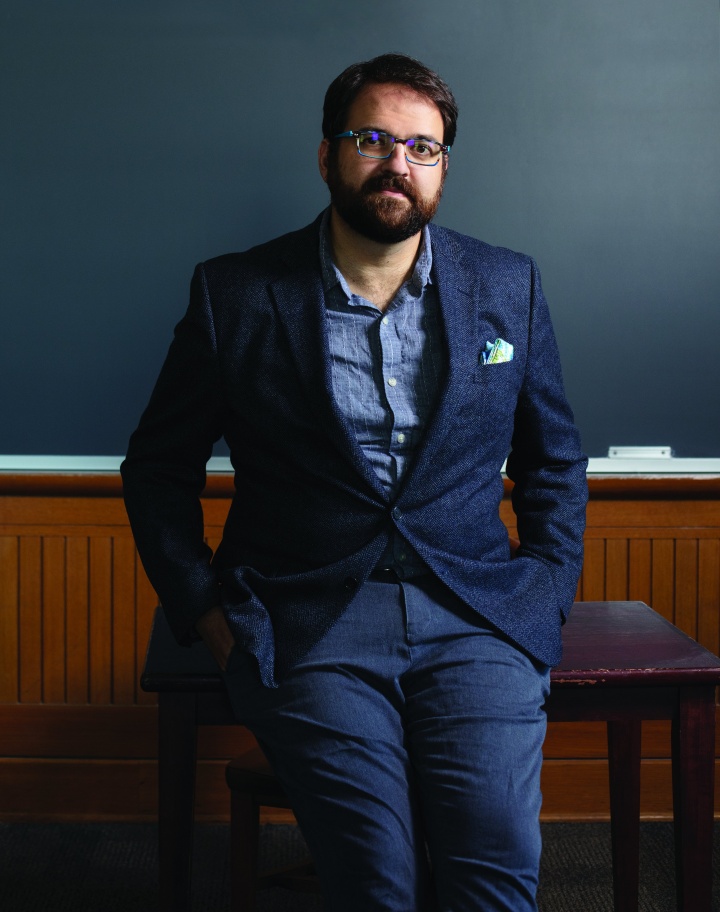Columbia College | Columbia University in the City of New York
Joseph Howley

“It seemed weird to call it ‘the first lecture’ because there’s no other Lit Hum lecture — it’s a seminar class,” Howley says. “One of the big growth experiences for first-year students is finding the confidence to have their own ideas and their own responses to the text. So the thing we didn’t want to do was establish the expectation that Lit Hum is about listening to someone who knows more than you do.”
Instead, on August 31, Howley gave a brief introduction, then a group of rising sophomores joined him on stage for a discussion about their Lit Hum experiences. Finally, he did a Q&A with the new students about The Iliad. “I got to be their first professor contact — the one talking to them about what they’d read before they’d even met their Lit Hum instructor,” Howley says. “It’s been one of the exciting things so far about being the Lit Hum chair.”
Howley, an associate professor of classics, says there are two major components to his new role. First, he is teaching new preceptors and lecturers how to teach Lit Hum, which includes working with a cohort of 10 graduate student instructors on everything from syllabus design and pedagogy to how best to approach particular works in the curriculum.
The second part concerns the curriculum itself. All Core Curriculum syllabi are reviewed on three-year cycles, and Lit Hum will come due in Spring 2024. “I feel like preparing for that next syllabus review started on Day One for me,” Howley says. “These reviews are a regular opportunity to make sure this class is current, that it’s living up to its goals and to our ideals and values. We can’t just not think about it in between.”
Howley says he thinks of syllabus review as the action point in a continual process of discussion — with all parts of the Core Curriculum. “No part of the Core exists on its own,” he says. “We may be thinking about changes to Lit Hum that might have implications for other parts of the Core. Or we might want to know what other course administrators are working on before we think about changes we want to make.”
Howley will continue to teach one classics course every year, including Latin in the Spring 2023 term. In fact, Latin was what set him on the path to academia; he clicked with it as a high school student in Silver Spring, Md., and then “wandered into” a classics major at the University of Maryland Baltimore County, where he discovered the field was not just about language and literature, but also culture and history. “As a kid I had been interested in the ancient Romans,” he says. “In college I really started to understand that Latin was not just an interesting and cool language — it was opening a door into ancient Roman culture.”
He earned a master’s and Ph.D. at the University of St Andrews in Scotland; he taught there for a year as a grad student before starting at Columbia in 2011.
At the College, Howley developed a Global Core course on the history of the book. The class is a result of what he says was a seismic shift in his career: In 2014, while researching a journal article about book burning in ancient Rome, Howley applied for and was accepted into an Andrew W. Mellon Foundation-funded fellowship program at Rare Book School, an independent institute based at the University of Virginia. He took classes during the summer and organized and attended conferences there. “It gave me the tools I needed to formulate a new teaching interest,” he says. “Book history is a vibrant, interdisciplinary field.” The foundation invited Rare Book School to develop a self-sustaining successor program, known as The Andrew W. Mellon Society of Fellows in Critical Bibliography; Howley is its founding secretary.
Though he may have a full plate right now — he is also in the midst of a book project, Slavery and the Roman Book, and is a parent to two young children, ages 2 and 5 — Howley is excited to share the wealth. “When I think about what it means to be a professor, it’s about guiding students to have an encounter not just with knowledge, but with the pleasure of uncovering and creating knowledge. Not just learning the things that are in the textbook or on the syllabus, but how much learning can change your life.”
Issue Contents
Published three times a year by Columbia College for alumni, students, faculty, parents and friends.
Columbia Alumni Center
622 W. 113th St., MC 4530, 6th Fl.
New York, NY 10025
212-851-7852
cct@columbia.edu
Columbia Alumni Center
622 W. 113th St., MC 4530, 4th Fl.
New York, NY 10025
212-851-7488
ccalumni@columbia.edu

